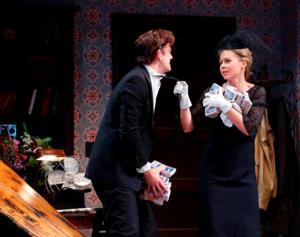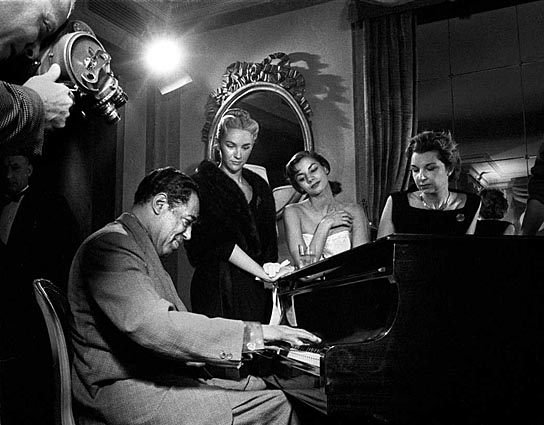In today’s Wall Street Journal drama column I review an important revival, Westport Country Playhouse’s production of Joe Orton’s Loot, and the off-Broadway transfer of a new musical, Nobody Loves You. Here’s an excerpt.
* * *
 Is there a blacker comedy than “Loot”? If so, I haven’t seen it. Alas, Joe Orton’s horrific tale of what happens when a thick-witted police detective in hot pursuit of a sexy multiple murderer takes the law into his own hands is so dark that American audiences have yet to embrace it. First performed in England in 1965 and last seen on Broadway 27 years ago, “Loot” ought to be far more familiar than it is. Not only is it gobsmackingly funny, but its anti-authoritarian message grows more timely by the hour. Yet major revivals remain uncommon on this side of the Atlantic, enough so that Westport Country Playhouse’s riotous production is the first chance that I’ve had in the past decade to write about “Loot.”
Is there a blacker comedy than “Loot”? If so, I haven’t seen it. Alas, Joe Orton’s horrific tale of what happens when a thick-witted police detective in hot pursuit of a sexy multiple murderer takes the law into his own hands is so dark that American audiences have yet to embrace it. First performed in England in 1965 and last seen on Broadway 27 years ago, “Loot” ought to be far more familiar than it is. Not only is it gobsmackingly funny, but its anti-authoritarian message grows more timely by the hour. Yet major revivals remain uncommon on this side of the Atlantic, enough so that Westport Country Playhouse’s riotous production is the first chance that I’ve had in the past decade to write about “Loot.”
The trouble with “Loot,” if trouble it be, is that Orton’s plays, all of which were written between 1963 and his untimely death four years later, have a reputation for being too sexually forthright for the comfort of the matinée crowd. But what was once thought shocking is now anything but: I saw “Loot” on Sunday afternoon in Westport, and nobody in the audience seems to have been appalled. Presumably they were all too busy chortling at the lunatic twists and turns of a whodunit that revolves around a corpse that has been extracted from its coffin, stashed in the nearest cupboard, and replaced with a bagful of cash. Enter Inspector Truscott (David Manis), who suspects Fay (Liv Rooth), the corpse’s nurse, of having done away with her client, not realizing…and that’ll do for the plot of “Loot,” which is so magnificently complicated that a fuller synopsis would spoil at least half the fun, if not more.
The point of “Loot,” of course, is that Truscott, far from being a shining symbol of British justice in action, turns out to be a vicious and corrupt buffoon: “When I make out my report I shall say that you’ve given me a confession. It could prejudice your case if I have to forge one.” But Orton, whose contempt for authority in all its guises was limitless, swathes his anarchic sermon in the gaudy robes of farce…
 “Nobody Loves You,” the new Itamar Moses-Gaby Alter musical about a reality-TV series, has transferred from San Diego’s Old Globe, where it had a deservedly successful run last summer, to New York’s Second Stage Theatre. I saw the show in California and found it both ingenious and touching, so I’m pleased to report that “Nobody Loves You” is as fine here as it was there. It is, in fact, the smartest new musical comedy to come along since “The Drowsy Chaperone.”
“Nobody Loves You,” the new Itamar Moses-Gaby Alter musical about a reality-TV series, has transferred from San Diego’s Old Globe, where it had a deservedly successful run last summer, to New York’s Second Stage Theatre. I saw the show in California and found it both ingenious and touching, so I’m pleased to report that “Nobody Loves You” is as fine here as it was there. It is, in fact, the smartest new musical comedy to come along since “The Drowsy Chaperone.”
For those of you just joining us, Jeff (Bryan Fenkart) is a snobby-nerdy philosophy major who gets dumped by his TV-addicted girlfriend and chooses to pursue her by auditioning for “Nobody Loves You,” a “Survivor”-style series hosted by a pretty-boy airhead (Heath Calvert) whose contestants compete with one another to find true love. Instead of courting one of the other contestants, he falls for the show’s no less snobby-nerdy production assistant (Aleque Reid), after which things get really complicated really fast.
So what’s good? Absolutely everything. The book is sharp-witted, the parody-flecked songs clever and catchy….
* * *
Read the whole thing here.
The trailer for the 2012 Old Globe premiere of Nobody Loves You:

 Was Ellington as great a lover as he’s said to have been?
Was Ellington as great a lover as he’s said to have been?